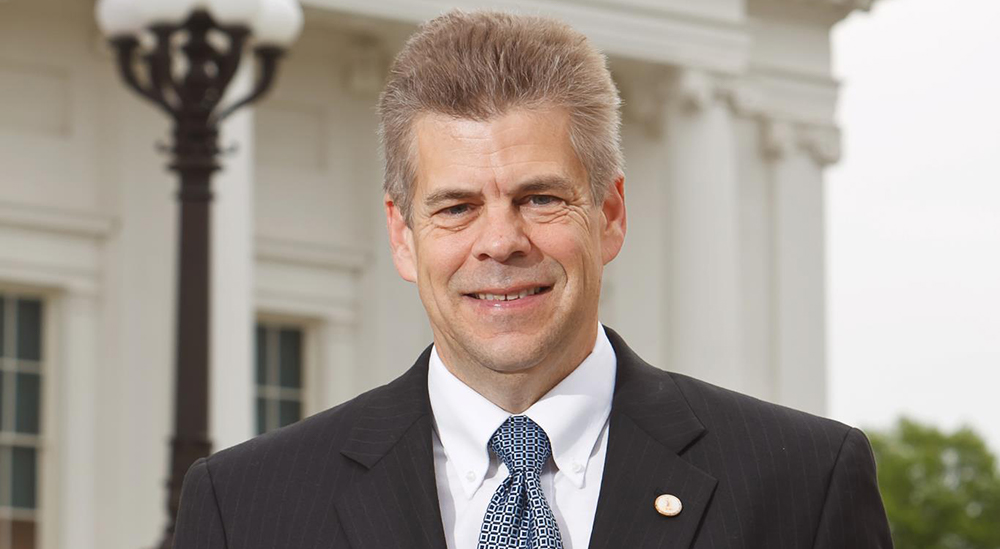Virginia’s post-secondary students could gain increased access to affordable higher education in high-demand fields, and expanded work-study opportunities, under the terms of an “education partnership” bill introduced by Republican Speaker Kirk Cox (R-Colonial Heights).
Cox’s legislation, introduced today as HB2653, would allow public institutions of higher education to implement partnership agreements which advance the objectives of the Virginia Higher Education Opportunity Act of 2011.
These agreements partner universities and colleges with job-creating businesses to align their programs with the needs of the workforce, giving students access to programs teaching in-demand skills for which jobs are available after graduation. Partners would include businesses, large and small, established as well as start-ups.
Agreements would be strategically targeted at sectors providing the best opportunities for economic growth in Virginia.
Under the terms of Cox’s bill, the performance agreements submitted as part of each institution’s six-year plan would address issues such as tuition, fees, and financial aid, internship opportunities, and enrollment of Virginia resident students.
The agreements would measure and reward college performance based on student outcomes, ensuring that Virginia’s graduates receive good value for their tuition and enter the workforce with an in-demand diploma capable of earning a good salary and benefits.
Additionally, they would expand work-study opportunities for Virginia students, helping ease the problem of affordability, while also giving soon-to-be graduates real-world experience which employers increasingly want to see on an applicant’s resume.
Virginia currently ranks 42nd nationally in work-study opportunities.
“This legislation—the first bill I have patroned as Speaker—is a vital vehicle for making college affordable for all Virginians and for tapping the full potential of our top-ranked higher education system as an engine of talent development and economic growth. It recognizes the different missions and capabilities of our public colleges and universities and the different strengths they bring in achieving our economic goals,” said Cox, a retired public school teacher who spent 30 years in the classroom. “These agreements will be the lynchpin of partnerships that I believe have the ability to transform our Commonwealth. If business, higher education, and state government work together as partners, we will achieve many more big economic development wins, and thousands more young Virginians will find great jobs without having to leave the state.”
“These partnership agreements are all about access to marketable degrees, workplace experiences, and good jobs,” added Senator Siobhan Dunnavant (R-Henrico), who introduced similar legislation in the Senate. “By making reliable investments tied to performance, we can create affordable pathways from our top-ranked college classrooms and labs, to highly valuable internships, to great first jobs, to rewarding careers—and, ultimately, to fulfilling lives.”
The business community reacted favorably to the legislation, noting that workforce development and access to top talent were vital to growing Virginia’s economy. For years, business leaders have asked lawmakers for expanded partnerships capable of providing the skilled workforce necessary to allow Virginia to compete against other states and internationally.
Under Cox’s bill, Virginia’s public colleges and universities would play an expanded role in helping students from Virginia develop the skills they need to land high-paying jobs in Virginia.
“We applaud the Speaker’s leadership and foresight,” said G. Gilmer Minor III, chairman of the Virginia Business Higher Education Council. “His remarks this fall struck a chord with business and higher education leaders, and we are ready to help. We have been making the rounds and hear only strong bipartisan support for the idea of institutional partnership performance agreements.”
“If we needed more evidence that higher education is Virginia’s chief competitive advantage in attracting job-creating investments, we certainly received it with Amazon’s decision to come here despite more lucrative offers elsewhere,” noted Nancy Howell Agee, president and chief executive officer of Carilion Clinic. “The legislation offered by Speaker Cox and Senator Dunnavant will make sure we’re all working together and investing where it will have the greatest return for students and for our Commonwealth.”
“Our talent pipeline sets Virginia apart,” said Barry DuVal, president and CEO of the Virginia Chamber of Commerce. “It’s a product of forward-looking reforms like this one by Speaker Cox and Senator Dunnavant and the bipartisan commitment to business-higher education collaboration that we have seen in the Commonwealth over the years. This proposal will take that partnership to a new level.”
Back in October, Cox wrote at length about the proposal in an op-ed published by the Richmond Times-Dispatch, calling for a fresh approach to aligning higher education with in-demand jobs available in Virginia.
“We are not effectively connecting the dots between what the talent development programs are teaching and what it takes to succeed in this fast-changing economy,” he wrote.
“As a result, Virginia’s economic growth trails that of most other states. Businesses cannot find the qualified workers they need. And many young people educated in Virginia are leaving for better opportunities elsewhere. For four years now, we have suffered a net loss of talent to other states.”
In particular, the speaker highlighted a statistic noting that Virginia currently ranks 42nd in the nation for work-study opportunities for students.
“If we can create pathways from school to jobs, with a meaningful work experience along the way, then we can brand Virginia nationwide as the place to get a great education in a top-ranked higher education system and then land a great job in a dynamic innovation economy,” Cox continued.
Cox’s bill will be considered by lawmakers during the 45 day legislative session, which convened Wednesday and is scheduled to continue through mid-February.

